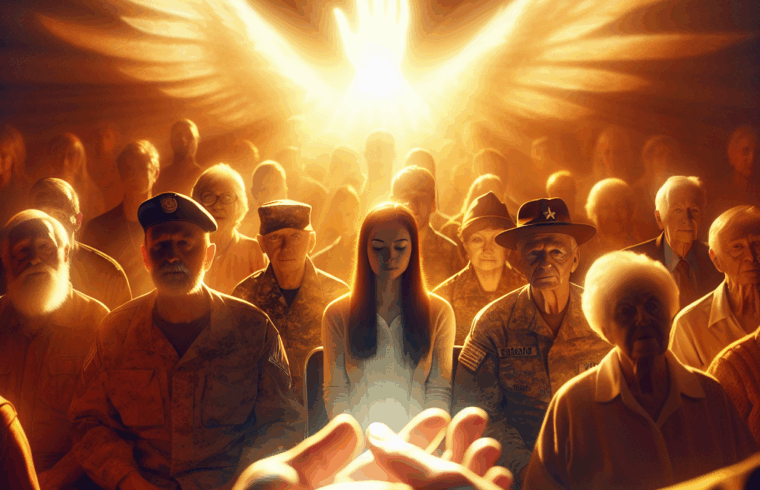==> Thank you for reading this post! Click Here If you are looking for support and Victory over PTSD.
Faith-Based Healing
The Role of Faith in Recovery
From my own experience, faith plays a massive role in healing. I remember struggling with my own demons after service, and it was during these dark nights that I discovered how powerful faith can be. The idea that someone greater than ourselves is watching over us, guiding us through our pain, offers a comforting perspective that we often forget.
Faith doesn’t just alleviate stress; it can also help rebuild the community perspective that many veterans lose after returning home. Finding a support group that encourages spiritual discussions or Bible study can be eye-opening. Connecting with others who share the same values magnifies that sense of belonging.
I’ve had moments where prayer has been my anchor, especially in times of high anxiety. When everything feels chaotic, taking a moment to meditate or send out my thoughts to God has helped ground me and put my worries in perspective.
The Benefits of Spiritual Communities
There’s something incredibly powerful about being around people who share the same beliefs. When veterans come together in a faith-based setting, it isn’t just about the prayers; it’s about the friendships formed through shared experiences. I’ve seen how community can make the weight of our burdens a little lighter.
Yeah, sometimes going to church feels like a chore, but when I engaged with a veterans’ group within that community, it became a lifeline for me. We often discuss shared experiences and draw strength from our faith stories. It’s like a brotherhood that transcends the initial service bond.
Spiritual communities can offer workshops, counseling, and various resources tailored specifically for veterans. They understand our struggles on a deeper level, and they foster an environment where healing can blossom.
Finding Personal Connection to Faith
The journey of finding what faith means on a personal level can be both exhilarating and challenging. I found this by exploring different churches, reading scripture, and really questioning what I believe. It’s enriched my life and has been essential on my path toward recovery.
Establishing a personal relationship with Jesus brought me something I didn’t know I was missing – hope. This isn’t just for Sunday services; it’s about an everyday connection that can help one stay grounded amidst chaotic life circumstances.
By examining stories of Jesus and how he interacted with the outcasts and the broken, it becomes evident that I, too, am worthy of healing and love. This powerful realization has sparked a transformation in how I view life and my service.
Therapeutic Practices
The Impact of Prayer and Meditation
Prayer became one of my top go-to therapies. It’s not just about traditional prayer but also the feel-good practices that come with it, like meditation and deep breathing. I began to embrace these moments of stillness where I could talk to God and unwind from day-to-day stress.
When I meditate, I focus on breathing and visualize the burdens I carry being lifted away. This practice has helped reduce anxiety and improve my mental clarity, making tough days a bit easier to navigate. It’s like hitting a mental reset button.
I also love combining prayer with gratitude. Before bed, I take a few minutes to reflect on the day and thank God for the good moments, big or small. This simple act shifts my mindset and influences how I approach each new day.
Engaging in Nature
Nature has always been my sanctuary. Hiking, biking, or simply walking outside allows me to connect with both God and myself. There’s a unique peace that comes from being surrounded by creation, and it often stirs up conversations with God.
This connection to nature has provided a unique form of therapy for me. I’ve realized how vital it is to set aside time for these experiences. It helps keep my spirit refreshed and my mind clear. Nature reminds me of the beauty of life, something that can often escape us.
I’ve met fellow veterans on these trails, sharing stories, laughter, often filled with reflection. Those moments remind me I’m not alone in this journey. The bonds formed through these experiences are invaluable.
Arts and Expression
Creative outlets are a great way to channel emotions that might be hard to express otherwise. Whether it’s drawing, writing, or even music, engaging in the arts has opened my heart and mind to healing. There’s power in creating something that reflects how we feel.
Writing my stories has been particularly therapeutic. I’ve drafted letters to myself, poetry, and short personal narratives about my time in service and my ongoing journey. It’s not just about sharing, but understanding myself more profoundly, which is crucial in the healing process.
Music has this universal connection too. I’ve found that listening to gospel music or even creating my own songs can shift my mood and connect me back to my faith. Experiencing these artistic forms has been incredibly liberating and affirming for my spirit.
Support Systems
The Importance of Family and Friends
You know, nothing beats the support from family and friends. These bonds are incredibly vital for veterans like me, especially after the challenges of service. When I was dealing with my struggles, my family’s unconditional love provided me with a strong foundation to rebuild myself on.
Having honest conversations with loved ones about mental health made me feel way less isolated. They didn’t always understand my experiences fully, but their willingness to listen went a long way. Sometimes, just knowing there’s someone to share those silent battles with is enough.
Creating an environment at home where open conversation is welcomed helps normalize discussions about mental health. It lifts the fog of shame that can surround these topics, making it easier for me and others to seek help when needed.
Get Support and Help with Recovery! Visit us for more Information and Support
Community Programs
Joining local veteran support programs helped me find my footing. These programs provide resources and counseling that specifically cater to our experiences, making me feel truly seen and understood. The camaraderie with fellow veterans truly is unparalleled.
Whether through formal counseling or informal gatherings, these support systems allow us to share stories and offer each other guidance. Talking about our struggles with those who get it brings a healing impact that is hard to find elsewhere.
In addition, many of these programs incorporate wellness activities and workshops focused on healing through faith and creativity. They keep reminding me that I’m not alone on this journey and that I can take steps forward alongside others.
Professional Help and Guidance
For many veterans, including myself, seeking professional help is a crucial step in recovery. Therapists specializing in veteran issues understand our unique experiences and can guide us through the healing process with greater empathy.
It was daunting going to therapy at first, but establishing trust with my therapist became a pivotal point in my journey. They helped me break down mental barriers, develop coping mechanisms, and find ways to integrate faith into my healing.
There are also faith-based counseling options that incorporate spiritual practices as part of therapy—an approach that resonated deeply with me. This combination of psychological and spiritual guidance is instrumental in fully healing.
Living a Purposeful Life
Finding Meaning Through Service
Serving others has become fundamental to my life after transitioning out of the military. It creates a sense of purpose, and I often find that the joy in giving back fills my own emotional void. Volunteering with veterans’ organizations keeps me connected to my community.
Engaging in service allows me to utilize my experiences to uplift others. It feels incredible knowing that my stories can inspire someone just starting their healing journey. Sharing our struggles is powerful; and sometimes, encouragement leads to breakthroughs for both parties.
Being part of something bigger than myself has tangible effects on my mental health. Knowing that I can make a difference ignites a spark of hope and fulfillment within me that I didn’t realize I was missing until I began serving others.
Setting Personal Goals
Creating personal goals revitalizes my journey of healing. I’ve started by setting small, achievable targets that encourage growth. After struggling with PTSD, I realized that even the smallest of victories deserve celebrating.
Regularly reflecting on these goals and the progress I make keeps my journey in perspective. I’m able to witness my resilience and adaptability, which bolster my confidence over time.
As the journey continues, I also remind myself to be kind and patient with my progress. Every step forward is a chance to learn and grow. Setting meaningful goals effectively navigates through ongoing healing.
Fostering Gratitude
Practicing gratitude is an essential part of my daily routine. It has shifted my mindset, offering me joy and fulfillment in the simplest aspects of life. I keep a gratitude journal where I write down three things I appreciate each day. This has opened my eyes to the positives I may have overlooked.
Expressing gratitude can easily become a communal activity too, whether in family discussions or in veteran support circles. It creates an atmosphere of positivity that fuels the spirit and encourages everyone involved to focus on the brighter side of life.
Gratitude helps counteract the pessimism that can creep into our minds—a conscious choice to celebrate my journey, no matter how challenging, has transformed my outlook. This practice has undeniably empowered my healing journey.
Conclusion
Through faith, therapeutic practices, support systems, and a purposeful life, I have come to understand the profound healing power of Jesus for veterans like myself. It is a journey that requires patience and openness, but the rewards are immeasurable. By embracing community, engaging in self-exploration, and taking steps toward physical and spiritual betterment, we can find light in our dark places and emerge resilient.
Frequently Asked Questions
1. How can faith contribute to a veteran’s healing process?
Faith can provide hope, community support, and a sense of purpose, which collectively foster emotional resilience. Many veterans find strength in spiritual beliefs that guide them while navigating their challenges.
2. What are some practical therapeutic practices veterans can adopt?
Practices such as prayer, meditation, journaling, and engaging in the arts have proven effective. They allow for emotional expression and help create a calming routine conducive to healing.
3. Why are support systems vital for veterans?
Support systems form a crucial foundation for recovery as they provide camaraderie and understanding among those who have shared similar experiences, which can significantly ease feelings of isolation.
4. How can veterans find purpose after service?
Finding purpose can come through volunteering, setting personal goals, and fostering gratitude. Engaging in activities that give back to the community can instill a sense of fulfillment and leadership.
5. What role does professional help play in the healing journey?
Professional help from therapists specializing in veteran issues can offer tailored guidance and coping strategies, easing the mental health challenges faced upon returning to civilian life.













